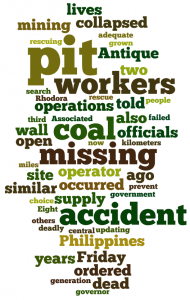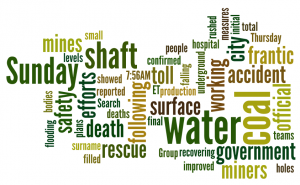I created a word cloud based on a recent article 07/17/15 I found through Mark Nowak’s blog that he keeps updated with news reports on coal mining  disasters and other events/articles that may relate. If you’d like to look at his blog it is interesting to see how relevant and prevalent this issue is, as well as just how continually invested he is in the topic.
disasters and other events/articles that may relate. If you’d like to look at his blog it is interesting to see how relevant and prevalent this issue is, as well as just how continually invested he is in the topic.
This is a word cloud that puts emphasis on the words used the most. For example, in the article “5 Die, 4 Missing in Collapse of Coal Pit Wall in Philippines” the language used by ABC News to briefly describe a recent collapse of the mines due to heavy rains. The language of the news report puts emphasis on the “pit” or location where they were digging and equal emphasis on workers-coal-missing-accident. What I interesting about this is that almost every news report on this accident looks and feels the same. There is little emphasis put on the actual workers–there is no commentary about their lives. The article even mentions the victims were brought in on plastic bags. I wonder why a detail like that is necessary?
I’d like to create a few word collages to see if a particular region treats the news the same. Nowak set out to document this marginalized group of people by capturing all sides. He did take news reports like this one into account, but then decided to make sure the word “workers” became part of the focus. “Accident” isn’t what these events are.
The Philippines are one of the top 3 producers of coal. China is #1. So I looked at another article written, this time from China in May.
 This time, notice the emphasis on blame: “water” and “coal” – there is little mention of the actual miners as well. I took this as an example of how the coal miners are seen and unseen. They are residual. Nowak sets out to provide a voice and exposure to the voiceless.
This time, notice the emphasis on blame: “water” and “coal” – there is little mention of the actual miners as well. I took this as an example of how the coal miners are seen and unseen. They are residual. Nowak sets out to provide a voice and exposure to the voiceless.
This would be considered Documentary Poetry according to our author himself. You can find an article about his thoughts here.
“Finally–and I claim this only for my own documentary practice and not to the tendency as a whole–I believe that documentary poetics needs to participate not only in the social field of contemporary Poetry but—as has been its historical trajectory—in the larger social movements of the day. It needs to find its feet outside of AWP and art galleries and instead locate itself (or organize its potential location) on factory floors, in union halls, at political rallies, in collaboration with institutions and organizations working to shift the Draconian policies under which conservative school boards, Tea Partiers, and neoliberal politicians of the world (unite!?!) seek to police the rest of us.”
It will be interesting to discuss today in terms of genre, formatting and how we are supposed to handle the school lessons.